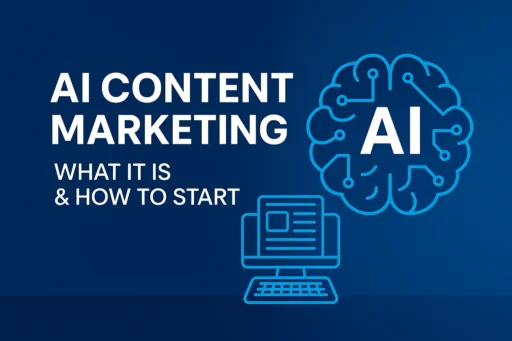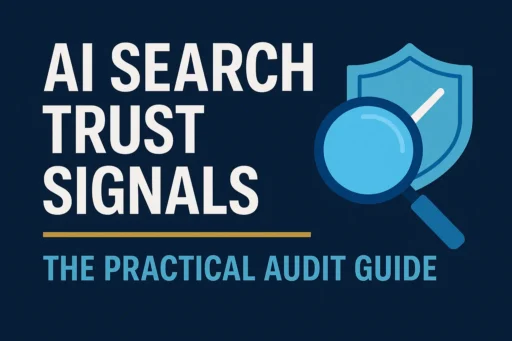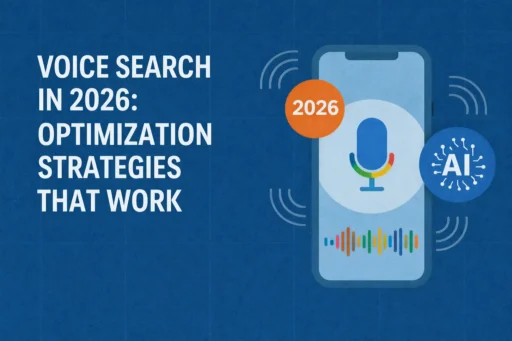AI content marketing is transforming how businesses connect with their audiences in 2025. With 88% of marketers using AI daily and the AI marketing sector reaching $47.32 billion in 2025, it’s clear that artificial intelligence has moved from experimental to essential. At Search Savvy, we’ve witnessed firsthand how AI-powered content strategies are helping brands create more, engage better, and scale faster than ever before. Whether you’re a marketing manager, small business owner, or content creator, understanding AI content marketing isn’t just advantageous-it’s critical for staying competitive in today’s digital landscape.
This comprehensive guide will walk you through everything you need to know about AI content marketing, from fundamental concepts to practical implementation strategies that deliver measurable results.
What Is AI Content Marketing?
AI content marketing leverages artificial intelligence technologies-including machine learning, natural language processing, and generative AI-to streamline and enhance content creation, distribution, and optimization processes. Rather than replacing human creativity, AI content marketing acts as a powerful assistant that handles repetitive tasks, generates initial drafts, analyzes performance data, and provides insights that would take hours to uncover manually.
At Search Savvy, we define AI content marketing as the strategic integration of intelligent automation tools throughout your entire content lifecycle. This includes everything from brainstorming and keyword research to content generation, optimization, personalization, and performance analysis. The technology works by analyzing vast amounts of data-including consumer behavior patterns, trending topics, competitor strategies, and historical performance metrics-to inform smarter content decisions.
According to recent data, 87% of marketers use AI to help create content, making it one of the most widely adopted technologies in the marketing space. The tools range from AI writing assistants like ChatGPT and Jasper to comprehensive platforms like MarketMuse and Surfer SEO that handle everything from strategy to distribution.
How Does AI Content Marketing Work?
AI content marketing works through sophisticated algorithms that process information, identify patterns, and generate outputs based on trained models. The technology operates on several levels, each serving distinct functions within your content strategy.
Natural Language Processing (NLP) enables AI to understand, interpret, and generate human language. When you input a prompt into an AI writing tool, NLP analyzes your instructions, contextualizes them against its training data, and produces relevant content that matches your specifications. This same technology powers sentiment analysis, helping you understand how audiences feel about your brand or topics.
Machine Learning allows AI systems to improve continuously by learning from data patterns. Over half (51%) of marketing teams use AI to optimize content, and these optimization decisions become more accurate as the system processes more information. For instance, AI can analyze which headlines perform best, what time of day generates maximum engagement, and which content formats resonate most with specific audience segments.
Generative AI represents the newest frontier, capable of creating original content from scratch. More than half of marketers (56%) claim generative AI content outperforms human content in certain applications. These tools can produce blog posts, social media captions, email sequences, video scripts, and even visual assets based on text descriptions.
According to Search Savvy’s experience, the most effective approach combines AI efficiency with human expertise. AI handles the heavy lifting-research, initial drafts, data analysis-while humans provide strategic direction, brand voice refinement, and creative oversight.
Why Is AI Content Marketing Important in 2025?
AI content marketing has become essential in 2025 because consumer expectations, competitive pressures, and technological capabilities have converged to create an environment where traditional content approaches simply can’t keep pace.
Scalability Without Sacrificing Quality: AI use allows companies to publish 42% more content each month compared to those not using AI. This increased output doesn’t mean compromised quality-when properly implemented, AI helps maintain consistency while dramatically expanding your content production capacity.
Competitive Necessity: The numbers tell a compelling story. 84% of marketers report AI improved the speed of delivering high-quality content, and 85% of executives say AI gives them a competitive edge. Businesses that haven’t adopted AI content marketing risk falling behind competitors who are producing more, learning faster, and optimizing more effectively.
Cost Efficiency: While there are upfront investments in AI tools and training, the long-term cost savings are substantial. Marketers save 3 hours per piece of content and 2.5 hours per day overall with AI tools. At Search Savvy, we’ve calculated that these time savings translate to significant budget reallocations toward strategic initiatives rather than tactical execution.
Personalization at Scale: Modern consumers expect personalized experiences. 72% of companies using AI and automation personalize customer experiences, creating more relevant content that drives higher engagement and conversion rates.
Data-Driven Decision Making: AI processes vast amounts of performance data to identify what works and what doesn’t, enabling continuous optimization. This eliminates guesswork and ensures your content strategy evolves based on actual results rather than assumptions.
What Are the Key Benefits of Using AI in Content Marketing?
AI content marketing delivers numerous advantages that directly impact your bottom line. Understanding these benefits helps justify investment and guides implementation priorities.
Enhanced Productivity and Speed: In 2025, 71.7% of content marketers use AI for outlining, 68% for content ideation, and 57.4% for drafting content. This widespread adoption reflects AI’s ability to accelerate every stage of content creation. What once took days can now be accomplished in hours, allowing teams to respond quickly to trending topics and market opportunities.
Improved Content Quality: AI tools like Grammarly ensure grammatical accuracy, while platforms like Hemingway Editor improve readability. More sophisticated tools analyze content against top-performing competitors, suggesting improvements for structure, depth, and keyword optimization.
Better Performance Outcomes: Marketers using AI are over 25% more likely to report success with their content than those that don’t use AI. Additionally, 25.6% of marketers report that AI-generated content is more successful than content created without AI.
SEO Optimization: 86.5% of top-ranking pages contain some amount of AI-generated content, and 91.4% of pages cited in AI Overviews contain some amount of AI-generated content. This demonstrates that search engines don’t penalize properly-implemented AI content-they reward quality and relevance regardless of how it’s created.
Consistency Across Channels: Search Savvy recommends using AI to maintain brand voice consistency across multiple platforms. AI tools can be trained on your brand guidelines and previous content to ensure every piece aligns with your established identity.
Predictive Analytics: AI doesn’t just analyze past performance-it predicts future trends. By identifying emerging topics, seasonal patterns, and audience behavior shifts, AI helps you stay ahead of the curve rather than reacting to changes after competitors have already capitalized on them.
How Do You Get Started with AI Content Marketing?
AI content marketing implementation requires strategic planning rather than simply purchasing tools and hoping for the best. Here’s Search Savvy’s proven framework for successful adoption.
Step 1: Audit Your Current Content Process
Before introducing AI, map your existing content workflow from ideation through distribution and measurement. Identify bottlenecks, repetitive tasks, and areas where quality inconsistencies occur. These pain points represent your highest-priority opportunities for AI integration.
Step 2: Define Clear Objectives
Establish specific, measurable goals for your AI content marketing initiative. Are you aiming to increase content output by 50%? Reduce time-to-publish by 30%? Improve engagement rates by 25%? Clear objectives guide tool selection and success measurement.
Step 3: Select Appropriate AI Tools
ChatGPT is the most common AI model for content creation, used by 44% of respondents, followed by Gemini (15%) and Claude (10%). However, tool selection should align with your specific needs:
- Content Generation: Jasper, Copy.ai, or Writesonic
- SEO Optimization: Surfer SEO, MarketMuse, or Clearscope
- Content Planning: StoryChief or CoSchedule
- Social Media: Hootsuite or Buffer
- Analytics: Google’s Looker Studio
At Search Savvy, we typically recommend starting with one or two tools rather than overwhelming your team with multiple platforms simultaneously.
Step 4: Develop Quality Control Processes
AI-generated content requires human oversight. 60% of marketers who use generative AI content are concerned it could harm brand reputation due to bias, plagiarism, or values misalignment. Establish review workflows that verify factual accuracy, ensure brand voice consistency, check for potential biases, and confirm proper sourcing.
Step 5: Train Your Team
Successful AI adoption depends on team competency. Provide training on prompt engineering-the art of crafting effective AI instructions-and establish best practices for when to use AI versus when human creation is more appropriate. Share examples of successful AI-generated content and common pitfalls to avoid.
Step 6: Start Small and Scale Gradually
Begin with low-stakes content like social media posts or blog outlines. As your team gains confidence and refines processes, gradually expand to more critical content types. This measured approach minimizes risk while building organizational capability.
Step 7: Measure and Optimize
Track performance metrics consistently. Compare AI-assisted content against traditionally-created content to quantify impact. 62.8% of content marketers reported traffic growth year-over-year, demonstrating that well-implemented AI strategies deliver measurable results. Use these insights to refine your approach continuously.
What Challenges Should You Anticipate with AI Content Marketing?
AI content marketing delivers significant benefits, but implementation isn’t without challenges. Search Savvy has identified several common obstacles and strategies for overcoming them.
Quality and Authenticity Concerns: AI-generated content can sometimes feel generic or lack the nuanced understanding that comes from deep subject matter expertise. Combat this by using AI for first drafts rather than final outputs, incorporating original research and expert perspectives, and always adding your unique brand voice and insights.
Data Privacy and Compliance: AI regulation is still in its early days, meaning many widely available tools are in a compliance gray area. Ensure any AI tools you use comply with GDPR, CCPA, and other relevant regulations. Avoid inputting sensitive customer data into AI platforms unless you’ve verified their security protocols.
Bias and Inaccuracy: Artificial intelligence platforms reproduce the inherent bias in the data they were trained on. Review AI-generated content for potential biases, fact-check claims and statistics, and diversify your AI tool selection to avoid over-reliance on a single perspective.
Integration Complexity: Connecting AI tools with existing marketing technology stacks can present technical challenges. According to Search Savvy’s implementation experience, working with IT teams early in the process and prioritizing tools with robust API capabilities and pre-built integrations helps minimize friction.
Change Management: AI will require upskilling 1.4 billion people globally in the next three years. Team members may resist AI adoption due to job security concerns or skepticism about technology’s capabilities. Address these concerns transparently by emphasizing that AI augments rather than replaces human creativity, providing training and support, and celebrating early wins to build confidence.
Cost Considerations: While AI tools can reduce long-term costs, upfront investments in subscriptions, training, and process redesign can be substantial. Start with freemium or lower-tier plans to demonstrate value before committing to enterprise solutions.
How Is AI Content Marketing Evolving Beyond 2025?
AI content marketing continues to evolve rapidly, and staying informed about emerging trends positions your organization for continued success.
AI Overviews and Search Evolution: AI Overviews reached 1.5 billion monthly users and have grown by 116% since the March Core Update. AI Overviews show for 12.8% or more of all Google searches by volume. This shift means content strategies must optimize not just for traditional search results but also for inclusion in AI-generated summaries.
Multi-Modal Content Creation: Future AI tools will seamlessly integrate text, images, video, and audio generation. This enables comprehensive content campaigns created from a single prompt, dramatically reducing production time and ensuring consistency across formats.
Hyper-Personalization: AI will enable individualized content experiences at scale, with dynamic content that adapts to each visitor’s preferences, behavior history, and current context. According to Search Savvy’s projections, this represents the next frontier in customer experience optimization.
Voice and Conversational AI: With the average ChatGPT user clicking 1.4 external links per visit, conversational AI platforms are becoming significant traffic sources. Optimizing content for voice search and conversational queries will become increasingly important.
Ethical AI and Transparency: As consumers become more aware of AI-generated content, transparency about AI usage may become a trust-building factor. Brands that clearly communicate their AI practices and maintain high quality standards will likely earn consumer confidence.
Frequently Asked Questions (FAQ)
What is the difference between AI content marketing and traditional content marketing?
AI content marketing uses artificial intelligence tools to automate, optimize, and scale content processes, while traditional content marketing relies primarily on manual creation and analysis. The key difference lies in speed, scalability, and data processing capabilities-AI can analyze millions of data points and generate content drafts in minutes, whereas traditional approaches require significantly more time and human resources. However, both approaches benefit from human strategy, creativity, and oversight.
Can AI-generated content rank well in search engines?
Yes, AI-generated content can rank excellently when properly optimized and reviewed. 86.5% of top-ranking pages contain some amount of AI-generated content, and there is no correlation between AI content percentage and search ranking position. Search engines prioritize content quality, relevance, and user value regardless of creation method. The key is ensuring AI-generated content receives human editing for accuracy, depth, and originality.
How much does AI content marketing cost?
AI content marketing costs vary widely based on tools selected and implementation scope. Individual AI writing tools typically range from $10-100 per month, while comprehensive enterprise platforms can cost $500-5,000+ monthly. However, marketers save 3 hours per piece of content and 2.5 hours per day overall with AI tools, which often results in net cost savings when accounting for productivity gains and reduced need for additional staff.
Will AI replace content marketers?
No, AI will not replace content marketers but will transform their roles. AI reshapes marketing roles, shifting 75% of staff work to strategy rather than tactical execution. At Search Savvy, we see AI as an enhancement tool that frees marketers from repetitive tasks so they can focus on creative strategy, brand storytelling, relationship building, and high-level decision making-areas where human insight remains irreplaceable.
What are the best AI tools for content marketing in 2025?
The best AI content marketing tools depend on your specific needs, but top-rated options include ChatGPT and Claude for general content generation, Jasper and Copy.ai for marketing-specific writing, Surfer SEO and MarketMuse for optimization, Grammarly for editing and quality control, and StoryChief for multi-channel distribution. Most successful strategies use a combination of tools rather than relying on a single platform.
How do I maintain brand voice when using AI content marketing?
Maintaining brand voice with AI requires providing detailed style guides and examples to AI tools, reviewing and editing all AI-generated content before publishing, using AI tools that allow custom training on your existing content, establishing clear approval workflows, and regularly auditing published content for consistency. Many advanced AI platforms offer brand voice training features that learn your specific tone, vocabulary, and style preferences over time.
Conclusion: Embrace the Future of Content Marketing with Search Savvy
AI content marketing has transitioned from futuristic concept to present-day necessity. With 88% of marketers using AI daily and nine out of 10 marketers set to ramp up AI integration in 2025, the question is no longer whether to adopt AI but how quickly and effectively you can implement it.
At Search Savvy, we believe the most successful content strategies combine AI efficiency with human creativity. Technology handles the repetitive, time-consuming tasks-research, initial drafts, data analysis, optimization-freeing your team to focus on strategy, storytelling, and building authentic connections with your audience. This partnership between human and machine doesn’t diminish the importance of marketers; it elevates their role to more strategic, impactful work.
The organizations that will thrive in this AI-powered landscape are those that move beyond fear and skepticism to thoughtful implementation. Start small, measure results, refine your approach, and scale what works. The future of content marketing is here, and with the right strategy, tools, and mindset, your brand can leverage AI to create more compelling content, reach broader audiences, and drive measurable business results.
Ready to transform your content marketing with AI? The time to begin is now.







